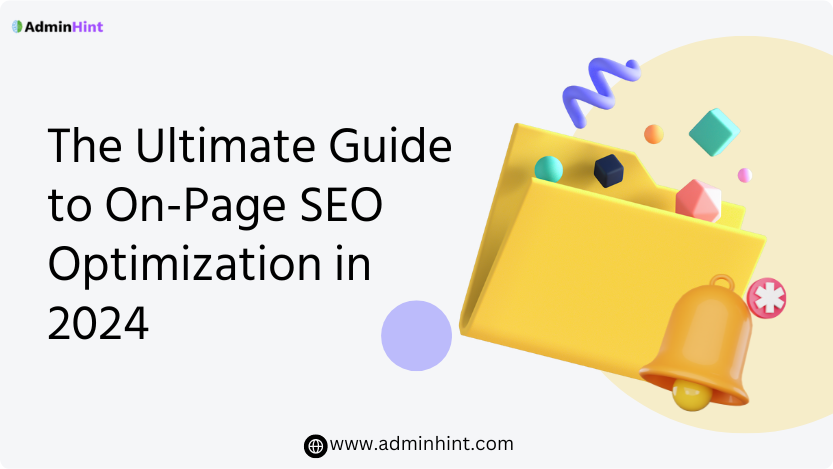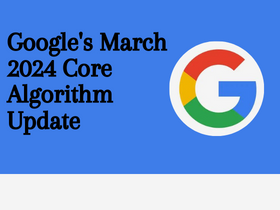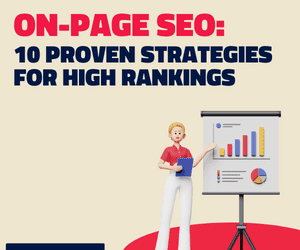In the constantly changing world of digital marketing, keeping up with the latest trends is crucial. As we enter 2024, the importance of on-page SEO optimization is more vital than ever for businesses aiming to boost their online presence and attract organic traffic to their sites. In this detailed guide, we take a deep dive into the nuances of on-page SEO, examining its essential elements, recommended strategies, and upcoming developments.
Introduction to On-Page SEO Optimization
On-page SEO entails the art of fine-tuning specific web pages to secure elevated rankings and attract a greater flow of pertinent traffic through search engines. Unlike off-page SEO, which focuses on external factors such as backlinks, on-page SEO revolves around optimizing elements within a website itself.
Understanding On-Page SEO in 2024

Importance of On-Page SEO
In 2024, search engine algorithms will continue to prioritize user experience and relevance. On-page SEO plays a crucial role in signaling the value and relevance of a webpage to search engines, ultimately influencing its ranking position in search results.
Key Components of On-Page SEO
On-page SEO encompasses various elements, including keyword optimization, content quality, user experience, and technical optimization. A holistic approach to on-page optimization involves optimizing each of these components to maximize visibility and engagement.
Keyword Research in 2024

Using Advanced Tools for Keyword Research
In the modern SEO landscape, keyword research has become more sophisticated than ever. Marketers leverage advanced tools and analytics platforms to identify relevant keywords with high search volumes and low competition, allowing them to tailor their content strategy accordingly.
Long-Tail Keywords and Their Significance
Long-tail keywords, comprising longer and more specific phrases, have gained prominence due to their ability to target niche audiences and capture intent-driven search queries. Incorporating long-tail keywords into on-page content can improve relevance and attract highly qualified traffic.
Content Optimization

Creating High-Quality Content
Content remains king in the realm of SEO. Producing high-quality, informative, and engaging content not only satisfies user intent but also earns backlinks and social shares, signaling authority and relevance to search engines.
Optimizing Title Tags and Meta Descriptions
Title tags and meta descriptions serve as the first point of contact between users and search results. Crafting compelling and optimized title tags and meta descriptions can significantly impact click-through rates and visibility in search engine results pages (SERPs).
Utilizing Structured Data Markup
Structured data markup, such as Schema.org markup, provides search engines with additional context about the content on a webpage. By implementing structured data, businesses can enhance their chances of appearing in rich snippets and other SERP features.
User Experience and Technical Optimization

Mobile Optimization and Page Speed
With the increasing prevalence of mobile devices, optimising websites for mobile responsiveness and fast loading times has become imperative. Mobile-friendly websites not only improve the user experience but also adhere to Google’s mobile-first indexing criteria, boosting search visibility.
Improving Site Navigation
Intuitive site navigation enhances the user experience by allowing visitors to find relevant content effortlessly. Clear navigation menus, internal linking structures, and breadcrumb trails contribute to a positive user journey and facilitate crawling and indexing for search engines.
Fixing Technical Issues
Technical issues such as broken links, duplicate content, and crawl errors can hinder a website’s performance in search results. Conducting regular technical audits and promptly addressing any issues ensures that the website remains accessible, indexable, and optimized for search engines.
On-Page SEO Best Practices

Optimizing Images and Videos
Optimizing multimedia content by using descriptive filenames, alt text, and captions improves accessibility and provides search engines with valuable context. Additionally, optimizing image and video file sizes enhances page loading speed and the overall user experience.
Internal Linking Strategies
Strategic internal linking helps distribute link equity throughout the website, strengthens topical relevance, and encourages deeper exploration of content. By linking related pages together, businesses can improve crawlability and facilitate the flow of page rank.
Optimizing for Featured Snippets
Featured snippets, also known as position zero, appear at the top of organic search results and provide concise answers to user queries. Structuring content in a format that addresses common questions and queries increases the likelihood of earning featured snippet placements.
Measuring and Monitoring On-Page SEO Performance

Using Analytics Tools
Tools like Google Analytics and Google Search Console offer valuable insights into the performance of your website, how users interact with it, and how visible it is in search results. Monitoring key metrics such as organic traffic, bounce rate, and keyword rankings enables marketers to assess the effectiveness of their on-page SEO efforts.
Tracking Rankings and Traffic
Regularly tracking keyword rankings and organic traffic enables businesses to identify trends, opportunities, and areas for improvement. By analyzing fluctuations in rankings and traffic, marketers can refine their on-page optimization strategies to maintain or improve search visibility.
Future Trends in On-Page SEO

Voice Search Optimization
With the rising popularity of voice-enabled devices and virtual assistants, optimizing content for voice search has become a priority. Businesses need to understand user intent and conversational queries to optimize content effectively for voice search and capture emerging opportunities.
AI and Machine Learning in SEO
Advancements in artificial intelligence and machine learning are reshaping the SEO landscape. AI-powered tools and algorithms can analyze vast amounts of data, identify patterns, and predict user behavior, allowing marketers to optimize content and user experiences with unprecedented accuracy and efficiency.
Conclusion
In conclusion, on-page SEO optimization will remain a fundamental aspect of digital marketing strategy in 2024. By understanding and implementing best practices in keyword research, content optimization, user experience, and technical optimization, businesses can enhance their online visibility, attract organic traffic, and stay ahead of the competition in the ever-evolving world of search engine optimization.






Leave a Reply